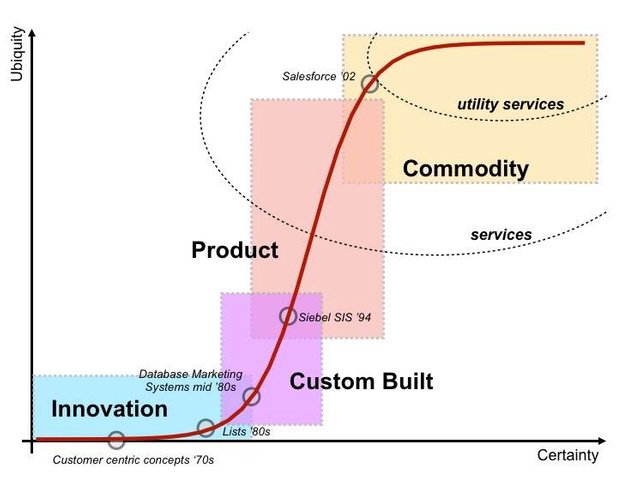How Ethereum Will Lead to Rapid Commoditization- SteemPress podcast Written series #3
What is a Commodity/Utility?
A commodity is a product that was originally created as a custom solution. Then, as people learned more about it, they started to realize that they could turn that custom solution into a product that many people could use and pay them for. When people learned even more, they finally found a way to make it a common component that everyone else could use.
Commoditization can be seen in the rise of electricity as a service. You can also see it happening right now in what AWS is doing with the cloud -trying to learn how to commoditize different server components.
What Causes Commoditization?
The reason this commoditization happens is that creators begin to learn how users are interacting with the products, what they're paying for, and which parts can be completely standardized. They then turn these standardized parts into a cheap component that can be charged per use.
Why Ethereum Accelerates Commoditization
What the blockchain does is create a veritable mountain of data about what people are using and paying for available on the blockchain, so EVERY company in the space is contributing to the understanding of the ecosystem as a whole.
Additionally, there are four other aspects of Ethereum smart contracts in particular that make them suited for rapid commoditization.
Firstly, smart contracts by default have their bytecode and data available to everyone. This openness makes it easy to clone contracts, which in turn raises the level of competition, and drives down the price as close to the margin as it can go. It turns out that marginal pricing is the first requirement of a commodify.
Secondly, each contract by default allows every other contract to use all it's functions and view all it's data. This means that every contract by default is set up to connect with every other contract. This inherent ability to connect is the second requirement of commodities.
Thirdly, by default contracts are immutable. This unchanging nature means that you can be 100% sure that a contracts interface won't change on you if you build on top of it. This also happens to be third requirement of a commodity.
Finally, Ethereum smart contracts, due to being tied in with Ether, all come with a built in way to charge users. Because this ability to charge users is so central to the Solidity language, it allows contracts to be incredibly fine grained and charge only for what the users are actually using within the contract. This ability to charge users for only what they're using happens to be the final requirement for a commodity.
Why Commoditization is the Bees Knees

As a result, you're going to see the entire ecosystem quickly taking any new innovations that consumers like and standardizing them into api contracts that charge per-use. In short, rapid commoditization.
Commoditization is a great thing. When a component is commoditized, entirely new things can be built on top of it, creating an explosion in innovation. Commodities also drive down the price, giving more access to more people. Commoditization is a good thing, and Ethereum will lead the way.
Reading, watching and learning!
Can you show me anything built on ethereum, that works?
I'm serious by the way-- commoditization IS the bee's knees, but.... can we build it on eth?
Right now you can buy gold on eEhereum (Digix) and it works. You can also gamble in a provably fair way (Rouleth, Etherdice, etc).
When you get a new commodity like Ethereum, you actually expect a period where general tooling is being built - this is due to the ecosystem having to go through the stages of innovation all over again for a new commodity:

Looking at the trajectories of what's being built in the ecosystem right now, I'd say we're just exiting the custom built stage, and we'll start seeing products (which is what you're really looking for) in the next few months.